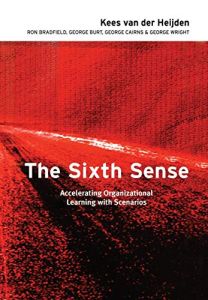Join getAbstract to access the summary!

Join getAbstract to access the summary!
Kees Van Der Heijden, Ron Bradfield, George Burt, George Cairns and George Wright
The Sixth Sense
Accelerating Organizational Learning with Scenarios
Wiley, 2002
What's inside?
The real reason to embark on scenario planning isn’t just to meet change head on — it is to survive as an organization.
Recommendation
This book disserves itself by purporting to be merely about scenario planning, although it covers that subject thoroughly. In fact, it’s one of the most lucid, interesting examinations of fortune and folly you will ever read. The recapitulation of disastrous episodes at a handful of once-great companies shows just how little inclined the gods are to spare the proud. Closed minds and entrenched habits of thought managed to afflict even such a venturesome New Economy firm as Yahoo! Originality and experimentation bless even companies in humdrum industries, such as packaging. Captivating anecdotes and illustrations are, in fact, the meat of the book. The scenario planning analysis, while solid, is less convincing than the cases themselves. At times, the book shows the weaknesses that are probably inevitable when so many authors share creation. It tends to meander and, now and then, loses its way in jargon-choked thickets. But, getAbstract.com assures you, the clarity of the cases redeems it and makes it valuable.
Summary
About the Authors
Kees van der Heijden is director of the Centre for Scenario Planning and Future Studies at the University of Strathclyde Graduate School of Business in Glasgow, Scotland, where Ron Bradfield, George Burt, George Cairns and George Wright are lecturers. Der Heijden also wrote Scenarios: The Art of Strategic Conversations. Bradfield directs the school’s MBA program in Asia. Burt is a qualified chartered accountant and scenario researcher. Cairns is a fellow of the British Institute of Facilities Management, and Wright is founder and editor of the Journal of Behavioural Decision Making and author of Strategic Decision Making: A Best Practice Blueprint.
















Comment on this summary